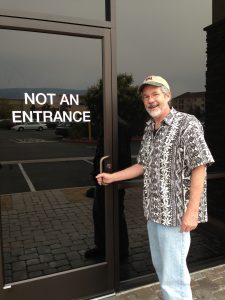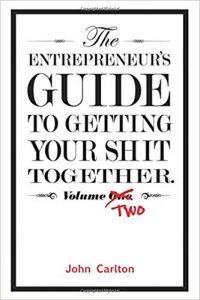
Monday, 7:01pm
Reno, NV
“There is nothing that cannot be achieved by a man who refuses to listen to reason” (Gary Halbert)
Howdy…
I was going to slap a quickie book on Amazon for you…
… stuffed with all the advice, shared wisdom, tactics and strange asides I’ve been assaulting folks with lately on my Facebook page.
But then I thought, “screw that”.
Why not just give the book to you here?
For free?
And that’s what I’m gonna do.
Hey, it saves me a ton of editing and detail work (which I loathe).
Title:
Brain Farts, Psych Insights, Strange Tales
& Goddamn Good Advice
The “bad Uncle” rantings of the most ripped-off and respected copywriter alive.
Table of Contents:
Chapter 1: The Big Damn Jenga Game That Is Your Future
Chapter 2: The 3 Types Of People Who Will Be Fucking With You Your Entire Life
Chapter 3: Respect Brilliance, And Brilliance Will Respect You
Chapter 4: Wait — Does Carlton Still Consult With Regular People?
Chapter 5: No Good Deed Goes Unpunished
Chapter 6: The Genius Of Operation Money$uck
Chapter 7: The Best Way To Learn From Mentors
Chapter 8: What’s Your Excuse?
Chapter 9: The Small Stories That Do The Most Work
Chapter 10: Becoming Mr. Persuasion Expert
Chapter 11: Where To Find The Eternal Truths Of Great Copywriting
Chapter 12: The Simple Tactic That Opens Doors For You Every Time
Bonus Chapter 13: When Logic Sucks
Introduction
Folks complain to me all the time about the length of many of my posts (especially here in the blog).
Well, fine.
Here’s a nice quickie book full of very short chapters...
… all of which nevertheless pack a vicious punch of insight and savvy.
You can read it in 11 minutes, unless you’re a plodding reader (like me). (I like to dawdle along, savoring the writing.)
Anyway, it’s free, so you don’t get a big, deep introduction.
Just enjoy…
Chapter 1
The Big Damn Jenga Game
That Is Your Future
Today’s Brain Fart Lesson: We all get lost sometimes.
The longer you live, the more it happens.
Even after you’ve succeeded, and nailed down your spot in the hierarchy (whatever it is, biz, family, team), you will never stay in one place.
The universe likes to screw with us, treating our plans and lives like a big Jenga game.
The occasional collapse is inevitable.
So it’s not necessarily a bad thing to wake up one day and realize you’re all lost again. It happens.
The only constant will be yourself, smack in the middle of all the melodrama, tragedy and chaos of a normal life. (You can ramp up the intensity of everything once you become an entrepreneur, too, so be prepared for a more jolting ride.)
Lost, found, lost, found.
Lost.
Found.
For me, a nice Zen approach to the ebbs and flows of life works.
It’s only when you freak out and panic that you get REALLY lost.
Remember who you are, and what you’ve survived… and why you’re here in the first place.
You have a purpose. It will sometimes shimmer just out of easy reach…
… and it will sometimes be in your face, like a flash bulb.
When you’re lost, it’s barely a dot on the horizon, and you’re not sure you even know what it is anymore.
Stay frosty. Keep calm.
No one gets out of here alive, but during the ride (however long or short it is) you’ve got control of the script.
This is what your network is for.
When you’re feeling lost, reach out. Don’t curl up and suck your thumb.
You’re normal. This shit happens. There is a way out (there’s ALWAYS a way around a bad spot…
… even if it’s not the solution you’ve hoped for). If you have medicine to take, take it. If you have to limp back to the beginning and start over, limp back and get going.
The universe, as capricious as it can be at times, respects movement.
Good luck, and carry on.
When you find love, cherish it.
When you stumble into chaos, fight.
Above all, keep moving…
Chapter 2
The 3 Types Of People Who Will Be Fucking With You
For Your Entire Life
Dept. of Adventure Junkies United, memo #38: I’ve lived long enough to realize there are basically 3 distinct types of people:
- Those who crave living through adventures, like crack addicts seeking peak thrills.
- Those who love adventure, but get as much enjoyment out of reliving them as they do going through them.
- And those who avoid adventure at all costs.
We call that last group “Safes”, meaning they play life safe, seldom straying anywhere near The Edge (and never, if they can help it, peeking over into the abyss).
I don’t have many acquaintances who are Safes. They don’t do well in my world.
I’ve spent most of my youth in the first camp. As kids, we dared Life to actually kill us as we fell out of trees, explored dangerous caves, jumped across roofs and rode bikes at speeds that drove our eyeballs back into our brains.
As a teen, it just got ridiculous. I have yet to see a “kids go crazy” movie that comes close to the wild-ass stunts and death-defying idiocy we performed on a regular basis (and that includes Animal House, Porky’s, Dazed And Confused, and any other one you can name).
And once I reached legal age…
… well, I’m not gonna discuss it here. Let your imagination run wild. It won’t come close to what we pulled off.
However, as I’ve mellowed a bit, I’ve backed off of experiencing adventure first hand. I just don’t heal like I used to.
Plus, it’s now as much fun to kick back and relive those memories with old pals as it was to generate the memories in the first place.
The top writers of the world all fuel their existence with raw adventure while young…
… and then write about it as they totter away from The Edge, glad for the experiences, ecstatic to have survived, and happy to have some pals around to share the tale with.
I feel sorry for the adrenaline junkies I’ve known — those poor souls who live fast, but never seem to have a story to tell. It’s all about the hormone dump, the internal chemical rush.
I get it. I know that flush of excitement over physical feats of insane boundary-testing very well…
… but it was just a side perk of the experience.
Mostly, I was after the STORY — the essence of doing something outrageous, living to tell the tale…
… and then TELLING the tale. And telling it with skill.
It’s important to understand these starkly different categories of people. You shouldn’t trick Safes into crawling up the side of a tall building downtown after a night of boozing. That’s not nice, and they won’t appreciate it.
The story they’ll tell is what a total asshole sociopath you are for making them do that shit.
And be wary of wandering off with the adrenaline junkies, if you’re not part of that tribe. They tend to die young.
And if you’re a writer…
… well, cherish the adventures you’ve had, make your bucket lists of adventures not yet realized and go after it…
… and keep honing your story-telling chops.
There’s nothing worse than sitting through a poorly-told tale, no matter how rousing the story COULD have been if shared with some pizzazz and skill.
One of the first things I reveal in the Simple Writing System is how to tell a story. It’s critical for anyone wanting to reach the next level up in biz (where all the Big Bucks and true happiness lives).
And — big treat — I’m going to personally teach a very special SWS class that begins the first of May, this year.
There won’t be very many spots available, cuz I like to keep my classes small (so I can really get to know you and offer personalized coaching customized to your particular needs).
I’ve only handled one class like this a year, and this may be the last one I personally teach.
So stay tuned if you’re at all interested.
Chapter 3
Respect Brilliance, And
Brilliance Will Respect You
Dept. Of Shiny Objects: I’ve been thinking about all the brilliant people I get to hang out with.
My biz partner, brilliant. The staggeringly long line of mentors throughout my career, all brilliant. The folks I share stages with at events…
… brilliant. (Well, okay, not all of them. Some duds in there. But mostly, by the time you reach a major stage, you’ve honed your brilliance to a sparkly sheen.)
My colleagues, especially the writers: Brilliant. My old college pals (who I still hang with regularly, and dangerously): Brilliant.
A good subset of the neighbors in this somewhat exclusive enclave I call home: Brilliant.
The lovely lady I share the hovel with: Brilliant.
I’m fucking surrounded by brilliance.
You’d think it’d get boring, after a while.
Naw. Just gotta remember to be patient with the less-than-brilliant people who populate most of the rest of the joint.
And, gotta remember not to take anything for granted.
You cannot imagine what it’s actually like to sit at a bar telling war stories with my writer friends. Or going on long road-dog adventures with my long-gone pal Gary Halbert (or his kid Bond).
Or going deep in one of our mastermind meetings…
…surrounded by the likes of David L. Deutsch, Kevin Rogers, David Garfinkel, the various guest experts I invite in, and most of the members.
The people around you are your braintrust.
It can take half a lifetime to gather a good group — especially if (like me) you’re a little weird and introverted.
But when you find the right folks, you hold on tight.
The world is filled with aggressive stupidity. It can be annoying hanging out with brilliant people (who ALL have bizarre behavior disorders, usually undiagnosed)…
… but it’s always worth it.
Always.
This is how stuff gets done in the world.
Brilliance will out.
(To find out more about the amazing Platinum mastermind I’ve hosted with my biz partner Stan Dahl for the last 10 years, go here.)
Chapter 4
Wait — Does Carlton Still Consult
With Regular People?
Just had a colleague (a colleague!) ask me if I do personal consultations.
Uh… yeah.
How in the world does a guy who’s known me, and flogged my stuff, for years…
… not know I’m still a hot commodity in the consultation game?
I figure it’s my fault.
I don’t flaunt it, cuz I can only take on a couple of clients each month. (Yes, I restrict my personal calls to just a couple a week. I love you guys, but only up to a point.)
So, flaunting: Yes, you can get me on the phone (or on Skype, or Zoom, or whatever new freakin’ app you’re now using)…
… to personally discuss your biz or situation, dissect and solve problems, critique copy, and generally access the decades of deep front-line experience I offer as The Dude Who Knows A Fuck-Ton About Making The Big Bucks.
In fact, there’s a blog post up about this very subject, right now, here.
It’s so easy to grab a spot in the line-up. Especially now, while so many folks are still in the dark on whether I even offer private consulting anymore.
Chapter 5
No Good Deed
Goes Unpunished
Today’s Hard Knock: One of the first rules I learned, while climbing the career ladder, is “No good deed goes unpunished.”
It only makes sense after you’ve seen it in action, and you’ve taken the time to reflect on the way it plays out in real life.
But many folks take the wrong lesson from this sad realization of human frailty.
The thing is, just because you will be punished for your good deeds, you don’t stop doing them.
You just stop expecting to be rewarded.
This is why it can get lonely at the top. If you harshly judge people by their as-yet-unenlightened actions, you are soon left as a solo act.
So learn your Hard Knock lessons, but don’t feel superior about it.
Be an agent of change and practice massive forgiveness.
Perhaps, by tending your own garden well, you will influence the world.
Or, hell, just go ahead and blow the joint up. It’s what humans do when frustrated and impatient.
A few will continue doing the right thing, against the tide…
Chapter 6
The Genius Of
Operation Money$uck
Operation Money$uck Rule #1: If money can fix a problem, don’t waste time trying to fix it yourself.
Instead, use your time to make enough money to pay your way out of the problem.
If a problem requires time, measure the cost vs benefit of YOU handling it (cuz your time is very valuable), vs delegating it to someone else.
If you’re the dude or dudette responsible for bringing in the moolah, then that’s your primary job.
I’m always astonished at busy entrepreneurs who do their own laundry, shopping and chores when it takes them away from the biz.
Then, I’m absolutely floored when I discover they also handle every detail in the biz. Right down to fixing the printer when it goes wonky.
First thing I did when I started my biz was hire an assistant. She’s still with me, 15 years later, and her worth cannot be calculated. She multiplied the amount of time I had available for doing the Op$uck stuff.
Your time is your most important resource. Every second you rob your biz of your cash-generating efforts is a loss on the bottom line.
Chapter 7
The Best Way To Learn
From Mentors
Some hard advice: Mentors active and successful in the real world are essential for anyone serious about leading in any part of life or business.
And it’s very difficult to find good mentors in academia. At least, that’s my experience.
Too many dumb rules.
You must venture into the “real world” to find the good ones.
I taught a single evening’s class each at both Exeter and the Missouri school of journalism, via Skype. It was a great little adventure, really glad I did it…
… but the students were not happy about being challenged. And I was lobbing softballs.
It was pearls before swine, I suspect.
In my first day with every real mentor I’ve ever had (notably Jay Abraham and Gary Halbert) I had my teeth metaphorically kicked in.
In my long experience, tough love is the best way to learn, with no second-best method in the running.
Academia has its place, and I learned a lot getting my BA (though very little in actual class).
But for entrepreneurs, it’s real world all the way.
Read copiously, but put what you learn to the test immediately.
Best advice for copywriters: Writers write…
… and great writers write with consequences.
Get busy. (And for crying out loud, go read my freaking blog.)
Chapter 8
What’s Your Excuse?
One of the very bright dividing lines separating happy, successful folks from the unhappy wannabe’s…
… are the role of excuses in moving through life.
Dudes and dudettes who get stuff done stare down obstacles and find ways through or around them…
… no matter how long it takes, or how many times they fail at it.
They’re the minority.
Much more common is the notion that having a good excuse lets you off the hook for getting something done.
Our bollocked-up school system encourages this — oh, your dog ate your homework? Okay, you can have an extra day.
And it just gets worse in adult life — oh, sorry I T-boned your car there, but I just broke up with my girlfriend and was re-reading her last text to me…
At some point, most civilians will be on their death-bed, looking back on their failures and crushed dreams, and have to find cold comfort in the idea that at least they had good excuses. They tried, sort of, and had their feelings hurt or their efforts rebuffed, and what can you do?
Life’s hard, right?
Okay, fine. Cuddle up with your excuses.
You might garner a bit of sympathy from some folks, but you’ll just continue to be disregarded by anyone feasting on life and getting shit done.
Start with being late. If you think it’s okay, as long as you have a plausible excuse (the traffic lights were absolutely conspiring against you, or gosh, clocks are just hard to understand, you know?)…
… then move to the back of the line right now.
You may actually HAVE a good excuse this time…
… but if being late is “who you are” (and yes, you are judged harshly and continually in the biz world on this stuff)…
… then consider WHY it’s a habit.
Look deep. It may be passive-aggressive behavior you picked up as a kid. It may be a symptom of happiness-corrupting disorganization (which no potential client wants any part of). It may be undiagnosed ADD, or even the first ripples of real cognitive disorder.
But usually, it’s just a habit. You keep getting away with it — or you THINK you’re getting away with it (and really, the people around you just stop relying on you, and consider you a liability).
The consequences seem mild — maybe somebody gets pissed off once in a while, or you miss a flight. Whatever. Life is hard, right? Get off my case.
The problem, of course, is that if you want to play in the level above you — in biz, romance, sports or just generally effective living — you are going to pay dearly for your bad habits.
Top clients won’t put up with sloppy non-professional behavior. Self-respecting potential romantic partners will avoid committing to you. And a whole bunch of cool life experiences will vanish…
… all because you think having a good excuse absolves you from the responsibility to be where you said you’d be, when you said you’d be there… prepared to do what you said you’d do.
Getting away with something is NOT the same as “succeeding”.
Highly effective people, who get shit done and succeed at life, rarely allow excuse-artists into their lives in any meaningful way.
Buy a fucking watch. Add twenty minutes to your estimation of how long you’ll need to get somewhere (or more)…
… and if you’re early, find a spot to kick back and check email or Facebook or just relax. Or read a book. There’s no such thing as “wasting time by being early”. Be prepared for it.
And it’s worth repeating: Yes, the people operating in the level above you ARE judging you by these small behaviors.
Maybe other folks in your world are just character actors, whose time isn’t worth much. (That’s the way stone-cold sociopaths think, you know.)
However, the successful crowd you want to be dealing with will not put up with that bullshit.
Okay, you better get moving. You’re gonna be late…
Chapter 9
The Small Stories
That Do The Most Work
Rumor Control, memo 34b: Here’s a fun exercise — for the next few days, pay attention to the stories people near you toss around as settled truth.
Ignore the politically-charged stuff. Too obvious.
Instead, note the smaller tales.
It’s easy, within an extended family, to spot foundational “facts” that are actually just shared assumptions with little or no evidence behind them.
Auntie Flo is just an eccentric, innocent old lady (not a dangerous self-medicating bipolar nutbar who keeps loaded guns in the silverware drawer).
Cousin Farquar’s sexual offender status is just a simple misunderstanding with the cops (and his 3 exes).
And your neighbors have concocted scripts about each and every household in the area (including yours).
Often, they won’t use names to identify a house, but plot lines. “Did you see the cop car parked over at the drug den yesterday?” says Mr. Perfect Lawn, while talking with That Hippie Couple across the street.
Noticing these smaller stories is how top ad writers become legendary.
It’s this kind of detail, plucked from real experience, that breathes life into a sales message.
I’ve been peppering my copy with snatches of observed reality since I first realized the potency of bringing the “truth” of human interaction to the selling game.
We are a whacky species, fueled by assumption, rumor, believable bullshit and tall tales invented out of thin air.
We all routinely just make stuff up to fill in the blanks.
We loathe blanks.
Understanding the mechanics of social interaction — with all its nonsense, silliness and fluff — is key to communicating effectively.
God help us.
Chapter 10
Becoming Mr. Persuasion Expert
The Spectacular Failure of Human Rationality, Part 5: I’ve been gleefully collecting stories of bizarre decision-making by my fellow humans for decades.
As a marketer, these tales are sobering revelations about what I’m up against trying to persuade prospects to do something.
As a caring friend, they’re a reminder not to beat my head against the wall when stubborn resistance makes efforts to help futile.
Top example: A medical doctor friend refuses to entertain even the idea that I solved my migraine problems through diet, massage and chiropractic.
She’s old-school medicine, educated in the days when the AMA taught that masseuses were hookers, vitamins were bullshit, and chiro’s were quacks (and she just ignores the fact the AMA long ago apologized, and now many modern docs work closely with chiro’s cuz, you know, the shit works).
No, somehow HER migraines (which are interferring with her life big-time) require drastic brain surgery. No amount of empirical evidence from pals can dent her resistance to an alternative.
This is cognitive dissonance on a major-league scale — she doesn’t think I’m evil or lying, yet she just cannot allow my story to be “real” in her mind.
So she simply refuses to acknowledge it.
The downside of trying non-surgical alternatives?
Zero.
No matter, she’s headed for the scalpel, to treat something other folks routinely beat with simple measures that don’t involve blood and removal of brain tissue.
You realize that this kind of stubbornness exists up and down the human decision-making process (from choosing what shoes to wear today, to who to marry and what car to buy) and you’re on the way to becoming Mr Persuasion Expert, for whom no objection is too weird or difficult to deal with.
Chapter 11
Where To Find The Eternal Truths
Of Great Copywriting
Just posted this in a damn good thread about finding the best copywriters to follow for advice and tactics (crowd’s ultimate decision: look for the gray-hairs)… thought you’d dig it:
“In truth, any copywriter who’s had sustained success for several years can help you with the basics.
IF they’ve written for multiple markets, weathered massive economic disasters, and gone up against other seasoned pros in hyper-competitive niches and won.
Too many writers luck out by exploiting rare conditions and early adoption of hot tech changes. Which is great for making money, but doesn’t mean they can thrive outside of those rare conditions.
Google slaps and Zuckerberg tantrums tend to frustrate writers who lack deep knowledge of advertising history.
To learn the eternal truths, yes, find the grizzled pros. But only those who aren’t bitter about how shit keeps changing.
There will always be massive and unfair upheaval in biz. The true grownups have learned how to adjust.
Don’t follow leaders, watch the parking meters…”
Chapter 12
The Simple Tactic That
Opens Doors For You Every Time
You want a simple tactic that will open doors for you?
Can’t believe I have to keep reminding folks of this…
… but just be very, very polite.
Say “please” and mean it.
Say “thanks” and mean it.
Call men “sir” (even if they’re younger than you), call women “m’am” (even when they’re younger than you), and listen intently when anyone is speaking to you.
Meet their eyes.
Do not argue, unless that is the dark alley you want to go down (and say goodbye to any doors that may have opened for you).
You know who the most polite people on the planet are?
Sociopaths, and folks who can kick your ass. They don’t give a ratfuck about the social “score” of who feels dominant in any given situation…
… and they want to get to their goals (which never, ever include arguing) as quickly and efficiently as possible.
Stop posturing.
If you’re good…
… or successful…
… or smart, experienced, talented, or can kick ass…
… folks will either find out soon enough, or they won’t.
It doesn’t matter.
Use the simple tools available to us socially to get people in rapport with you quickly, use charm to be non-threatening (when you can), and give others your total focus during conversations.
And remain committed to your goals.
I mean, Jeez Louise — you’re a nice person, who deserves more…
… yet the sociopaths and ass-kickers are waltzing through doors into opportunities that should have been YOURS.
Because they’re charming and polite and know how to move through social situations without an attitude.
Caring about the small shit is a sucker’s game.
Breathe deeper. Reach higher. Live bigger.
And please get my books. All of them, immediately. Devour them with gusto, and start moving up a couple of levels in life and biz.
You can find everything on the blog, right there in plain sight: john-carlton dot com.
Thanks.
Just sayin’…
Chapter 13
When Logic Sucks
Psych Insight #233: The idea that “logic” enters into buying decisions is ludicrous.
A super-rational Vulcan like Mr Spock may accidentally hit on the right way to sell something to a market, but it would only be coincidence if it was actually logical.
He was not a persuader.
The Voice Of Reason seldom is.
Humans operate in this roiling soup of emotion, confusion, delusion, excuses, denial, and wishful thinking…
… it’s what makes us so charming and fun.
The universe may work under gorgeously-precise rules of physics, but our brains are big clumps of chaos.
Great salesmen know this, and proceed accordingly.
—
That’s it, Bucko.
Nice, short book, crammed with wisdom, advice and insight to moving your slacker butt up another level in life and biz.
My gift to you.
Now go rummage through the books and courses for sale in the right-hand column, and buy something to fill in the blanks of your skill set and biz mojo…
And be sure to sign up for blog notifications, up top. You get another free book when you do that, you know.
It’s Freebie City here today…
Stay frosty,
John
Photo courtesy of Ms Significant Other
Resources Courtesy of John Carlton
Want to get all of John’s killer copywriting secrets?
John Carlton didn’t become one of the world’s highest-paid copywriters by accident. Over the years, he developed a system that he follows every time he sits down to write.
Once you get your hands on his methods, you can kiss writer’s block goodbye as you write the best ads of your life. Find out more here.
Looking for Shortcuts To Help You Create Spectacular Ads?
These techniques can supercharge your advertising even if you failed English class and think you’re a terrible writer. Intrigued? Find out more here.
Build Your Swipe File
Every marketer and copywriter needs a kick-ass swipe file to help create killer copy. These ads from John Carlton have raked in millions for his clients, and you can get them all right here.
Still want more?
Check out John Carlton’s book on Amazon right here.
Not by John Carlton… but Still Awesome!
High Speed Copywriting
The best way to increase your copywriting income? Create killer copy – FASTER. Anyone can be quick once they know the secrets revealed here.
David Deutsch Inner Circle
Get access to cutting edge copywriting secrets from a marketer with countless controls under his belt. It’s rare that a top writer is also an incredible teacher,











